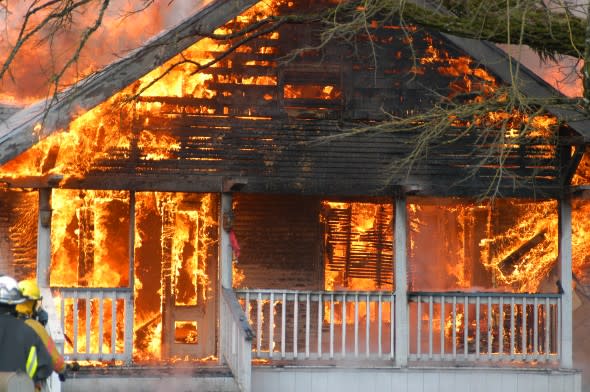What homeowners need to know about fire insurance
As devastating wildfires appear to worsen each year, many residents who might face potential impacts from future blazes might choose to take additional steps to ensure that their homes are adequately insured against fire damage.
While homeowners insurance does typically include coverage for destruction of a home and belongings as a result of a wildfire, coverage can vary based on the policy and where the home is located, according to Allstate. Some insurers also don't sell homeowners insurance policies in places that commonly experience wildfires.
What type of wildfire coverage can you expect?
Homeowners should be aware of what type of protection their insurance policy covers in the event of wildfire damage.
Insurance will typically offer coverage for your dwelling, which includes your house and attached structures like garages or decks, according to Allstate. Dwelling coverage may also help pay for any repairs or necessary rebuilding.
"If a wildfire damages a home, a standard homeowners policy typically covers the cost to fix the damage and replace any belongings that were damaged or destroyed as a result of the fire," said Michael Crowe, CEO of Clearsurance, an online publisher of insurance consumer data.

(Photo/mpruitt/Getty Images)
If the home is left uninhabitable, Coverage D in a standard homeowners policy, which covers loss of use, is designed to help homeowners with additional costs of living expenses, according to Crowe.
"Some of the expenses that may be included are hotel accommodations, additional meals that exceed the regular cost of living, pet boarding, storage fees and laundry bills," said Crowe, who added that it's important to keep all receipts for these expenses.
However, coverage for additional living expenses doesn't mean all costs after a wildfire are covered, according to Crowe. "For example, a homeowners mortgage payment or other expenses like birthday presents aren't included," he said. "The additional living expenses only covers expenses a homeowner wouldn't have had if it weren't for the wildfire, like temporary housing or a storage facility for belongings while the home is rebuilt."
You can also expect your belongings to be covered. Personal property including clothing and furniture are normally covered in a standard policy, but homeowners should review their specific policies for any limits on coverage.
You should review your homeowners insurance for possible landscaping coverage it may offer for your land and yard, as there might be limited coverage for damaged trees, shrubs or plants, according to the American Institute of Certified Public Accountants.
Important steps to take
"It's important to double-check with your policy, because some companies decide to have special exemptions for fire damage, especially with the increase in frequency and damage that has been caused by fires in the last decade," said Nathan Barber, digital content specialist for insurance comparison marketplace QuoteWizard.
"First, make sure to create a digital home inventory that itemizes all the things in your home, including estimated values and photos," Barber said. "Compare the total value of your belongings in your home inventory with the amount of coverage for your belongings in your policy."
It will also be helpful to create a list of and note the values for collectible items that are typically excluded from a homeowners insurance policy, including art, coins, jewelry, china, rugs and wine.
After you create your digital home inventory, you can then work with your agent to ensure that your valuables are covered, according to Barber. He also recommended remembering to take photos of the various materials and equipment in your home.
"If you have done extensive remodeling with new appliances, floors, roof, etc., you want to make sure it's covered in your policy if your home is destroyed," Barber said.
"Have your home inventory stored away from the home," he advised. "If it burns due to a wildfire and you lose your home inventory as a result, you won't have the proper information to get reimbursed in a timely manner."
When it's time to file a claim
The sooner a homeowner files a claim after wildfire damage, the better, experts say, as insurance companies in the area are likely to be inundated with an influx of claims after a wildfire.
"In order to get the claims process started quickly, the earlier the claim is filed, the more likely it is that you'll be helped sooner," Crowe said. "Insurance adjusters will also be requesting a description of each damaged item from the wildfire, so being organized with a home inventory will help make for a smoother claims process."
For more safety and preparedness tips, visit AccuWeather.com/Ready.

